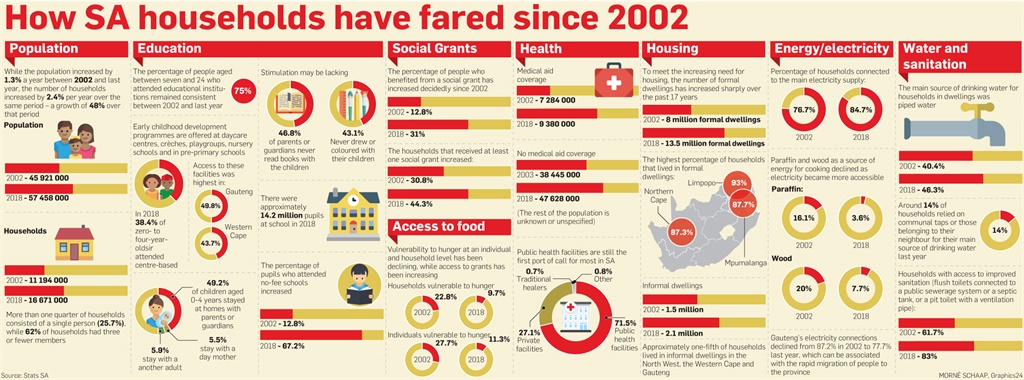More South Africans depend on social grants for their monthly survival today than they did 17 years ago – and while the grants have played a role in reducing hunger in individuals and families, they “certainly are not sustainable”.
This is according to Statistician-General Risenga Maluleke, who this week released Stats SA’s 2018 General Household Survey.
According to the report, the percentage of households and people who benefited from a social grant had “increased decidedly” since 2002 – most of these new beneficiaries are in the Eastern Cape.
The percentage of people dependent on social grants went from 12.8% in 2003 to 31.0% last year. Similarly, the percentage of households that received at least one grant increased from 30.8% in 2003 to 44.3% last year.
The Eastern Cape had the most grant beneficiaries, with at least 41.9% of people and 59% of households dependent on them for survival.
While receiving a government hand-out was not how 31-year-old Amanda Mtshilita wanted to make a living, the child support grant she receives helps her put food on the table for her two children.
“It has helped us so much because at least my children will have something to eat at the beginning of the month, you know?” she told City Press last week.
The Uitenhage, Eastern Cape-based mother of a six-year-old boy and a three-year-old girl said the R840 in total she got from government also helped with school transport fees for the children.
“It’s even worse for us people who didn’t finish school – I only have up to Grade 11 in education and finding a job has been so hard … it’s not that we don’t want to work or we are relaxed at home, it is just really tough. I want to get a proper job. Even as we speak, I am on my way to drop off my CV at Shoprite Checkers. I also did a course in security guard work, but never got lucky in finding work,” she said.
Chief Zwelenqaba Mgudlwa, spokesperson for the king of the abaThembu, said poverty and hunger were extreme in the province and there was simply no beating about the bush about that.
“You will find that our elderly people get R1 500 a month for a pension, yet they live with three or four of their children who are not working but are of working age,” he said.
“And then there are the young people who aren’t working, but keep giving birth and can’t fully support those children with the child grant. Then the young mothers look to their mothers to share their old-age grants, making the situation very difficult at home.”
Mgudlwa said they were pleading with government to help people get back to small-scale and subsistence farming – not only to make money, but to grow food for themselves.
“The only way to eliminate poverty and hunger is to go back to farming. Many of our people are also on antiretroviral treatment and living on starch such as umngqusho and pap, which is not healthy. But if they grew spinach and the like, they could get more vitamins in their diet. Government must look into farming for our youngsters so they can also come back from the cities.”
Social grants help, but services a disaster
Not having attained any formal education – nor have five of her children – poverty is all this woman has ever known.
Modjadji Ngobeni (49), who is from Maniini village outside Thohoyandou in Limpopo, still experiences the harshness that poverty has inflicted upon her life.
Sanitation barely enters the minds of many citizens, but, for Ngobeni’s family, access to water has always been a struggle.
“Since I moved to this place, I have never had a tap in my homestead. As a family, we have always fetched water from a village tap, which is a distance away from my house,” she said.
“When I applied for a tap to be installed in my homestead more than 10 years ago, I was told to pay R750, but I did not have the money to pay.”
Ngobeni has been a domestic worker for as long as she can remember.
Her current employer pays her R700 a month – her duties are to cook, clean and do laundry for her employer’s mother-in-law.
Apart from this, she also does piece jobs like people’s laundry at the weekend, earning as little as R150.
Last week, Stats SA released the results of its General Household Survey, which looked at more than 20 000 households across South Africa.
According to the results, 45.2% of households depend on social grants, and 64.8% of households receive salaries from various forms of employment, including income from businesses and pensions.
Limpopo is still lagging behind and access to sanitation is still a dire issue for families like Ngobeni’s.
Despite it being the province with the highest percentage of households living in formal dwellings (houses), the survey maintains that Limpopo still has limited access to improved sanitation such as flush or ventilated toilets, with only 56.9% of households having access to improved sanitation.
More than 17 million South Africans – one in five – rely on social welfare grants from the state, reports Stats SA.
The province also has the lowest percentage of educational attainment for people who are 20 and older, with only 21.9% in this age group having obtained a matric certificate.
Originally from Ka-Xikundu, a village located 50km from Thohoyandou, Ngobeni moved to Maniini 25 years ago when she got a stand.
“I then managed to build two rooms separately and went back home to fetch four of my children so that they could live with me because my eldest daughter was already married by then,” she said.
“My children tried to go to school, but they never reached matric. My last-born daughter only went as far as Grade 10, and that was in 2008. She then got pregnant and went to live with her partner,” Ngobeni said.
Currently, she stays with two of her children – a daughter who is unemployed and a son who works as a contractor. Five of her grandchildren also live in the dilapidated RDP house that the family officially received in 2010.
Although four of her grandchildren receive social grants, there is rarely enough money to get through the month.
Moreover, only 22.9% enjoy the service of weekly refuse removal.
“There is no such thing here,” said Ngobeni. “I always have to make a plan when it comes to taking the rubbish out.”
– Mukurukuru Media
TALK TO US
What can be done to bring millions of people in SA out of the dire cycle of poverty?
SMS us on 35697 using the keyword STATS and tell us what you think. Please include your name and province. SMSes cost R1.50. By participating, you agree to receive occasional marketing material
 |
| ||||||||||||
| |||||||||||||




 Publications
Publications
 Partners
Partners









